|
|
|
Sort Order |
|
|
|
Items / Page
|
|
|
|
|
|
|
| Srl | Item |
| 1 |
ID:
073474
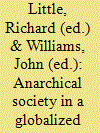

|
|
|
|
|
| Publication |
Hampshire, Plagrave macmillan, 2006.
|
| Description |
ix, 234p.
|
| Standard Number |
140398963X
|
|
|
|
|
|
|
|
|
|
|
|
Copies: C:1/I:0,R:0,Q:0
Circulation
| Accession# | Call# | Current Location | Status | Policy | Location |
| 051573 | 327.1/LIT 051573 | Main | On Shelf | General | |
|
|
|
|
| 2 |
ID:
115681


|
|
|
|
|
| Publication |
2012.
|
| Summary/Abstract |
We report new experimental evidence of the household response to weekday differentials in peak and off-peak electricity prices. The data come from Auckland, New Zealand, where peak residential electricity consumption occurs in winter for heating. Peak/off-peak price differentials ranged over four randomly selected groups from 1.0 to 3.5. On average, there was no response except in winter. In winter, participant households reduced electricity consumption by at least 10%, took advantage of lower off-peak prices but did not respond to the peak price differentials. Response varied with house and household size, time spent away from home, and whether water was heated with electricity.
|
|
|
|
|
|
|
|
|
|
|
|
|
|
|
|
| 3 |
ID:
185825


|
|
|
|
|
| Summary/Abstract |
Afghanistan is one of the most drone-affected states, however, very few scholarly studies of drone use there exist. This article uses original fieldwork data in a strategically important area of Afghanistan, eastern Nangarhar province, to analyse drone effects in context. It raises important concerns about the ability of the US to attain stated counterterrorism and counterinsurgency goals. Our results show contextualised analysis of drone use necessitates appropriate enquiry into policy, doctrine, and local circumstances. It also reveals serious incoherence, inaccurate assumptions, and insufficient appreciation of local circumstances and dynamics not only in US policy and doctrine, but also numerous scholarly studies of drone use effectiveness. This has far-reaching policy, operational, and research implications, including regarding local communities’ governance, relations, and resilience to insurgent and terrorist encroachment. Therefore, we contribute to debates about how to analyse and assess drone use and its effects, why drone analysis needs to change, and what more effective forms of research and analysis can reveal.
|
|
|
|
|
|
|
|
|
|
|
|
|
|
|
|
| 4 |
ID:
177074
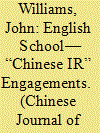

|
|
|
|
|
| Summary/Abstract |
This article addresses ongoing discussions across the English School (ES) of International Relations (IR) theory and IR theory drawing on Chinese philosophical traditions and Chinese history as exemplifying a “Global IR” approach. However, common interests in long-run history, non-material forms of power, and an international social structure have not yet led to sustained discussion of normative issues important to both approaches. Showing how analytical commonalities between ES and “Chinese” IR accounts of international societies and concepts of order and harmony focus on elite-level perspectives and priorities, I draw on critical and decolonial aspects of Global IR to argue for alternative accounts. Unexplored potential for this exists within the distinct methodological bases of ES and “Chinese IR,” opening space for normative engagement that can provide a model for other inter-tradition encounters in Global IR.
|
|
|
|
|
|
|
|
|
|
|
|
|
|
|
|
| 5 |
ID:
065504


|
|
|
|
|
| Publication |
Hampshire, Palgrave Macmillan, 2005.
|
| Description |
viii, 236p.
|
| Standard Number |
1403967830
|
|
|
|
|
|
|
|
|
|
|
|
Copies: C:1/I:0,R:0,Q:0
Circulation
| Accession# | Call# | Current Location | Status | Policy | Location |
| 050123 | 327.101/LAN 050123 | Main | On Shelf | General | |
|
|
|
|
| 6 |
ID:
097731
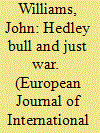

|
|
|
|
|
| Publication |
2010.
|
| Summary/Abstract |
This article explores the reasons for the absence of a systematic engagement with the tradition of Just War in the political theory of Hedley Bull, despite his recognition of war as a key institution of international society and his engagement with normative aspects of International Relations and the thought of Hugo Grotius, a key figure in the Just War tradition. Developing work arguing for Bull's highly problematic reading of Grotius, the article considers the impact of philosophical and methodological aspects of Bull's work to explain his rejection of Just War and to argue that this rejection is neither plausible nor beneficial to Bull's engagement with war as an institution. Additionally, the article considers the potential for and benefits of engagement between English School theory and the Just War tradition for efforts within the English School to more effectively establish its normative dimension.
|
|
|
|
|
|
|
|
|
|
|
|
|
|
|
|
| 7 |
ID:
061180


|
|
|
| 8 |
ID:
093673
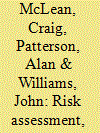

|
|
|
|
|
| Publication |
2009.
|
| Summary/Abstract |
This paper looks at the way in which the idea of the Precautionary Principle, increasingly influential in environmental and other policy areas, is being and might be used in foreign and security policy. It aims to contrast the relative precision with which the term is used in the environmental arena with the current usage in international relations. Contrasting the Precautionary Principle with ideas of precaution, prevention, pre-emption and similar terms in post-structuralist analyses of risk, humanitarian intervention and US foreign policy in the aftermath of 11 September 2001, the paper identifies costs and benefits in deploying a more carefully specified account of the Precautionary Principle. In particular, it highlights key issues of regulatory authority and the way in which policy-makers and analysts understand and respond to the limits of knowledge and knowledge systems as important challenges to which careful use of the Precautionary Principle can potentially contribute. The paper concludes by suggesting that both policy-making and policy analysis could potentially be improved by adapting and extending the idea of the Precautionary Principle as it is deployed in other policy arenas.
|
|
|
|
|
|
|
|
|
|
|
|
|
|
|
|
| 9 |
ID:
071311
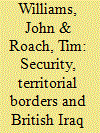

|
|
|
|
|
| Publication |
2006.
|
| Summary/Abstract |
This paper looks at the development of British government policy towards Iraq in the run up to and during the war of 2003 with particular focus on the territorial borders of Iraq. The paper argues that, in contrast to what we might expect from the perspective of classical geopolitics, the issue of the location of Iraq's borders was largely taken for granted by the UK government. The territorial integrity of Iraq was repeatedly asserted by British ministers, including the Prime Minister, Tony Blair. However, the paper suggests that this disguises an important and potentially significant challenge to the role that territorial borders played in the Iraq crisis and conflict, and this is connected to wider changes in thinking about territorial borders in international politics that have characterised the Labour government's foreign policy thinking. This challenge sees territorial borders' significance more in terms of the nature of the regime they help to delimit than the geopolitical significance of their location. Also, the respect to be given to those borders is significantly influenced by the willingness and ability of that regime to contribute to dominant political and politico-economic agendas, including democracy, human rights, counter-terrorism and economic liberalisation. It is argued that policy towards Iraq demonstrates effectively this distinctive approach developed by the UK government, and points to weaknesses as well as strengths of adopting such a position on one of the most important institutions of the international system.
|
|
|
|
|
|
|
|
|
|
|
|
|
|
|
|
| 10 |
ID:
088343


|
|
|
|
|
| Publication |
2009.
|
| Summary/Abstract |
This article contributes to current debates about Just War by analysing an insufficiently recognised problem with the way Just War theorists have responded to the two principal challenges surrounding the ethics of violence in international relations since the end of the Cold War - humanitarian intervention and the 'global war on terror'. The problem focuses on strongly embedded assumptions that exist in contemporary Just War debates about the nature and meaning of territory. The article argues that Just War needs to engage more systematically with challenges to dominant 'Westphalian' framings of territory, space and scale in order to contribute more effectively to important ethical debates about the use of violence in international relations.
|
|
|
|
|
|
|
|
|
|
|
|
|
|
|
|
| 11 |
ID:
105647
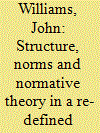

|
|
|
|
|
| Publication |
2011.
|
| Summary/Abstract |
This article looks at the significance of Barry Buzan's 2004 reformulation of the English School from the perspective of the normative dimension of English School theory. Picking up a challenge that Buzan set, but which has largely gone unanswered, for those who see normative theory as a key aspect of the English School's contribution, the article assesses three possible responses. It rejects a stance denying the relevance of Buzan's approach to normative theory and is dissatisfied with a second line that distinguishes methodologically between Buzan's social structural theorising and an approach to normative theory that draws principally on political theory. Instead, it argues for the inherent normativity of Buzan's position because of its reliance on values, arguing that many of the analytical benefits of Buzan's approach can also be deployed normatively because of the way he highlights contested and competing dynamics in play at different times and at different levels. The article suggests that this has the potential to revive pluralism as a normative position in the English School in a way that retains and extends the enhanced analytical power that Buzan's reformulation offers.
|
|
|
|
|
|
|
|
|
|
|
|
|
|
|
|
|
|
|
|
|